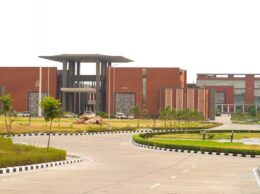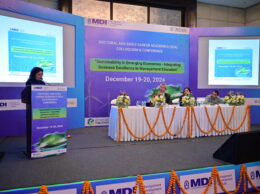GUWAHATI : Indian Institute of Technology Guwahati Researchers have developed a novel highly porous and water repellent superhydrophobic cotton composite material containing Metal-Organic Framework (MOF), which can absorb oil selectively from oil-water mixture.
The MOF composite has great capability for selective separation of the oils from oil/water mixtures, and the separation efficiency lies between 95% and 98%, irrespective of the chemical composition and density of the oils.
Besides, the MOF composite is also able to absorb large volumes of oils and can be reused for minimum 10 times so that the sorbents can provide more recovery of the spilled oil.
The practical applications of this Research include
-
Cleaning the spilled oil from environmental water (river, sea or ocean water) during oil transportation with high efficiency and large absorption capacity, thus reducing environmental water pollution
-
Both heavy and light oils can be effectively absorbed by the material
-
The material is easy to prepare, cost-effective and recyclable
The research team was led by Dr. Shyam P. Biswas, Associate Professor, Department of Chemistry. IIT Guwahati. The results of this pathbreaking work have recently been published in the reputed peer-reviewed journal ACS Applied Materials and Interfaces (https://pubs.acs.org/doi/abs/
Explaining the motive of the research, Dr. Shyam P. Biswas, Associate Professor, Department of Chemistry, said, “In our work, we focused on a real problem in environmental water pollution in current time. Our goal was to develop a new material which could be synthesized easily and should be cost effective. We have grown our new MOF material on the surface of medical cotton, which is environment friendly and cost effective. Such low-cost material will reduce the production cost of the material for large scale industrial synthesis for real applications, compared to currently available materials in the market”.
Further, elaborating on how this research will benefit the country, Dr. Shyam P. Biswas said, “In a vast country like India where petroleum hydrocarbons are the major sources of fuel, accidental oil spills occur frequently here during transportation and storage of oils. The material developed in our laboratory will certainly be beneficial to reduce the environmental water pollution by efficiently absorbing the spilled oil from environmental water.”
In the petroleum industry, oil leakage and oil spill accidents happen frequently during offshore oil exploitation and oil transportation. This severe water contamination threatens the health of human beings including other living species. Therefore, the treatment of industrial oily wastewater and the separation of oil spill from water has become a worldwide challenging task.
To overcome this problem, the IIT Guwahati researchers have synthesized a superhydrophobic MOF composite with cotton to absorb oil selectively from water. MOFs are a class of compounds containing of metal ions coordinated to organic ligands to form 3D structures, with the special feature that they are often highly porous materials that act like a sponge.
The team led by Dr. Biswas initially developed a superhydrophobic MOF which can repel the water and float on the water surface. Then, they grew the same MOF on the surface of medical cotton. It was observed that the medial cotton changes from hydrophilic to superhydrophobic material and can float on the water surface. The MOF-coated cotton fiber composite showed water repellence with a water contact angle (WCA) of 163°.
The flexible superhydrophobic MOF composite showed an oil absorption capacity more than 2500 wt%. Motor oil, kerosene and gasoline were used by the team in this study to investigate the real-life potential of the material for oil-spill clean-up. The research team has also demonstrated the separation of oil from oil/water mixture by simple gravity-directed filtration and also collection of underwater oil against gravity.
The growing environmental pollution is a serious threat to our society for sustainable development. Among the various environmental problems, water pollution is one of the serious issues in India. Until now, petroleum hydrocarbon products are the main energy sources in the world.









